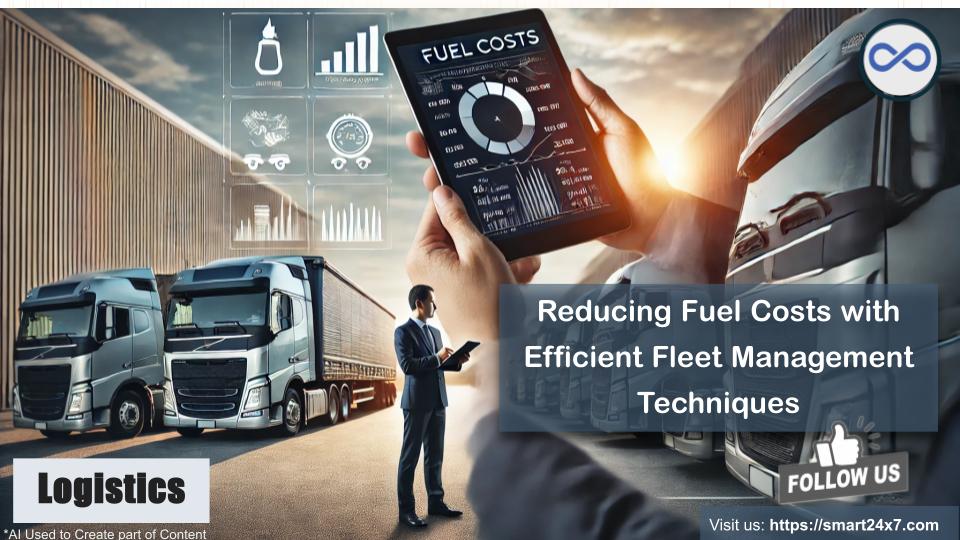Fuel costs represent a significant portion of operating expenses for any transportation business. For transport heads and procurement managers, reducing these costs is crucial for maintaining profitability and operational efficiency. At Smart24x7, a leading transport management system, we offer advanced solutions to help you optimize fuel consumption and reduce costs through efficient fleet management techniques. Here’s how you can achieve substantial fuel savings.
Implement Advanced Route Planning
Optimized Routing:
- Real-Time Traffic Data: Utilize live vehicle tracking and real-time traffic data to avoid congestion and select the fastest routes, reducing idle time and fuel consumption.
- Dynamic Routing: Adjust routes dynamically based on current traffic conditions, road closures, and weather forecasts.
Multi-Stop Efficiency:
- Route Sequencing: Plan routes to minimize travel distance and time by optimizing the sequence of stops.
- Load Balancing: Ensure even distribution of loads to prevent overloading and improve fuel efficiency.
Monitor and Improve Driver Behavior
Driver Training Programs:
- Eco-Driving Techniques: Train drivers on eco-driving techniques such as smooth acceleration, maintaining steady speeds, and avoiding unnecessary idling.
- Regular Refresher Courses: Conduct regular refresher courses to reinforce best practices and address any bad habits.
Behavior Monitoring:
- Telematics Systems: Use telematics systems to monitor driver behavior in real time, identifying issues such as harsh braking, rapid acceleration, and excessive idling.
- Feedback and Incentives: Provide feedback to drivers and implement incentive programs to reward fuel-efficient driving practices.
Regular Vehicle Maintenance
Preventive Maintenance:
- Scheduled Servicing: Adhere to a strict maintenance schedule to ensure vehicles are in optimal condition, reducing the risk of breakdowns and inefficiencies.
- Tire Maintenance: Regularly check and maintain tire pressure to improve fuel efficiency and extend tire life.
Advanced Diagnostics:
- Onboard Diagnostics: Utilize onboard diagnostics to monitor vehicle health and address issues before they lead to increased fuel consumption.
- Predictive Maintenance: Implement predictive maintenance strategies using data analytics to anticipate and prevent potential problems.
Utilize Fuel Management Systems
Fuel Monitoring:
- Real-Time Tracking: Monitor fuel consumption in real-time using live vehicle tracking to detect anomalies and identify areas for improvement.
- Fuel Theft Prevention: Use fuel management systems to track fuel usage and prevent theft or unauthorized use.
Data Analytics:
- Consumption Reports: Generate detailed reports on fuel consumption, identifying trends and areas for improvement.
- Benchmarking: Compare fuel efficiency across vehicles and drivers to set performance benchmarks and goals.
Optimize Fleet Composition
Vehicle Selection:
- Fuel-Efficient Models: Choose fuel-efficient vehicles that meet your operational needs without compromising on performance.
- Alternative Fuel Vehicles: Consider integrating alternative fuel vehicles, such as electric or hybrid models, to reduce dependence on traditional fuels.
Fleet Utilization:
- Right-Sizing: Evaluate and adjust the size of your fleet to match demand, ensuring you’re not operating more vehicles than necessary.
- Vehicle Retirement: Retire older, less efficient vehicles and replace them with newer, more fuel-efficient models.
Leverage Technology for Efficiency
Telematics and IoT:
- Real-Time Data Collection: Use telematics and IoT devices to collect real-time data on vehicle performance and fuel consumption.
- Smart Routing: Implement smart routing algorithms that consider multiple factors to optimize fuel efficiency.
Fleet Management Software:
- Centralized Management: Use fleet management software to centralize data and streamline operations, improving overall efficiency.
- Integrated Solutions: Ensure your fleet management system integrates with other enterprise systems for seamless data flow and decision-making.
Implement Policies and Procedures
Fuel Management Policies:
- Idling Policies: Establish and enforce policies to minimize idling, which can significantly impact fuel consumption.
- Speed Limit Policies: Set and monitor speed limits for fleet vehicles to optimize fuel efficiency and enhance safety.
Driver Engagement:
- Awareness Campaigns: Conduct awareness campaigns to educate drivers about the importance of fuel efficiency and their role in achieving it.
- Performance Tracking: Regularly track and communicate performance metrics to keep drivers engaged and motivated.
Reducing fuel costs through efficient fleet management techniques requires a combination of advanced technology, driver training, regular maintenance, and strategic planning. By implementing these strategies, transport heads and procurement managers can achieve significant cost savings and enhance the overall efficiency of their operations. At Smart24x7, we provide the tools and expertise needed to optimize fuel consumption and reduce operational costs.
Smart24x7 has been incubated by Smart Group India, demonstrating our commitment to innovation and excellence in transport management systems. Embrace these techniques and watch your fuel costs decrease.ues to transform your fleet operations and achieve substantial fuel savings with Smart24x7.
